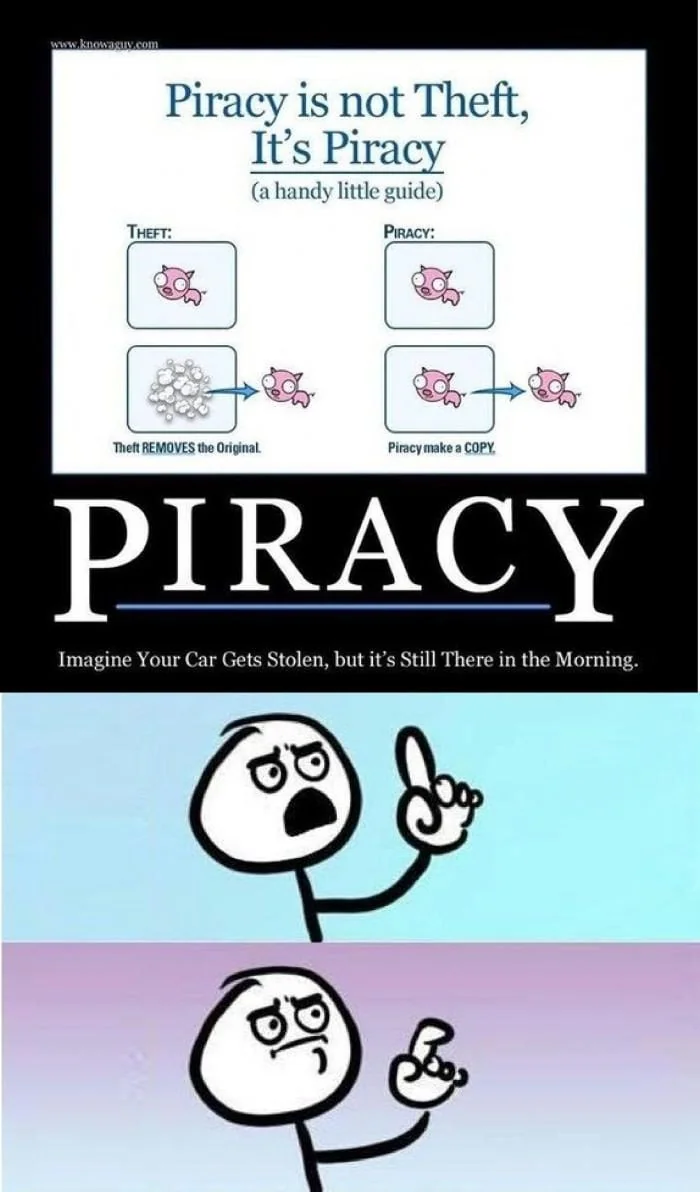this post was submitted on 05 Jul 2025
779 points (96.3% liked)
Piracy: ꜱᴀɪʟ ᴛʜᴇ ʜɪɢʜ ꜱᴇᴀꜱ
62574 readers
893 users here now
⚓ Dedicated to the discussion of digital piracy, including ethical problems and legal advancements.
Rules • Full Version
1. Posts must be related to the discussion of digital piracy
2. Don't request invites, trade, sell, or self-promote
3. Don't request or link to specific pirated titles, including DMs
4. Don't submit low-quality posts, be entitled, or harass others
Loot, Pillage, & Plunder
📜 c/Piracy Wiki (Community Edition):
🏴☠️ Other communities
FUCK ADOBE!
Torrenting/P2P:
- !seedboxes@lemmy.dbzer0.com
- !trackers@lemmy.dbzer0.com
- !qbittorrent@lemmy.dbzer0.com
- !libretorrent@lemmy.dbzer0.com
- !soulseek@lemmy.dbzer0.com
Gaming:
- !steamdeckpirates@lemmy.dbzer0.com
- !newyuzupiracy@lemmy.dbzer0.com
- !switchpirates@lemmy.dbzer0.com
- !3dspiracy@lemmy.dbzer0.com
- !retropirates@lemmy.dbzer0.com
💰 Please help cover server costs.
 |
 |
|---|---|
| Ko-fi | Liberapay |
founded 2 years ago
MODERATORS
you are viewing a single comment's thread
view the rest of the comments
view the rest of the comments


Disclosure: I have been sailing the seas for years, but...
This logic does no justice to the objective financial harm being done to the creators/owners of valuable data/content/media.
The original creator/owner is at a loss when data is copied. The intent of that data is to be copied for profit. Now that the data has been copied against the creator/owners will, they do not receive the profit from that copy.
Yes yes the argument is made that the pirate would not have bought the copy anyways, but having free copies of the content available on the internet decreases the desire for people to obtain paid copies of the data. At the very least it gives people an option not to pay for the data, which is not what the creator wanted in creating it. They are entitled to fair compensation to their work.
It is true that pirating is not directly theft, but it does definitely take away from the creator's/distributor's profit.
Also, the person deciding whether or not they "would have" paid for it, has a strong incentive to kid themselves that they wouldn't. Imagine if cinemas worked that way, and you could just walk in and announce that you weren't going to buy a ticket anyway and since there's a seat over there still empty it's not going to cost them anything for you to sit in it. They'd go out of business by the end of the week.
Also also, either the thing you're copying has value that arose from the effort of creating it, or it doesn't. If it's of value, then it's reasonable to expect payment for it. It's it's not of value, then you shouldn't miss not having it.
Podcasters and medium to small youtubers work like that (bigger also get some money from ads, but for medium to small, Patreon is the main source of revenue). You can get their shit for free, but they would like you to give them some money after if you can.
The scale is a bit different, but the scheme works.
It works for anything small scale enough for its creators to be able to do is as a side hustle that may or may not pay off. Try funding a triple-A game that way and see how far you get.
Ironically, it's actually doesn't work on a small scale. It works on a medium scale, big enough to have a stable audience, not big enough to get lucrative deals from brands.
It might not work to support a lifestyle of AAA company CEO, and it might not work at pushing out hundreds of unimaginative boring microtransaction machines, but I would say it's just a bonus
Triple A games are often over funded and under deliver in experience in my recent experience. A little less funding might tighten up some of waste and deliver better games.